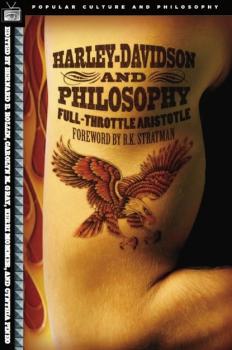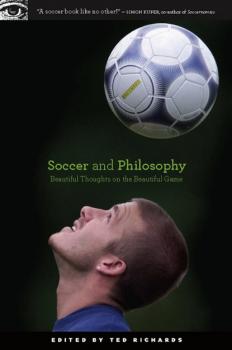ТОП просматриваемых книг сайта:
Popular Culture and Philosophy
Скачать книги из серии Popular Culture and PhilosophyАннотация
Does God play cards with the universe? Do women have better poker faces than men? What’s the most existential poker movie ever made? Is life more meaningful when you go all-in? Is online poker really still poker? Poker and Philosophy ponders these questions and more, pitting young lions against old masters as the brashness of Phil Hellmuth meets the arrogance of Socrates, the recklessness of Doyle Brunson challenges the desperation of Dostoyevsky, and the coolness of Chris Moneymaker takes on the American tradition of capitalist ingenuity. This witty collection of essays demonstrates what serious card sharks have long known: winning big takes more than a good hand and a straight face. Stacking the metaphorical deck with a serious grounding in philosophy is the key to raking it in, because as Machiavelli proved long ago, it’s a lot better to be feared than loved, and lying is not the same as cheating.
Аннотация
This collection of essays by philosophers who are also fans does a deep probe of the Sopranos, analyzing the adventures and personalities of Tony, Carmella, Livia, and the rest of television's most irresistible mafia family for their metaphysical, epistemological, value theory, eastern philosophical, and contemporary postmodern possibilities. No prior philosophical qualificationsor mob connections are required to enjoy these musings, which are presented with the same vibrancy and wit that have made the show such a hit.
Аннотация
It’s no wonder descriptions of riding often resemble the words of Asian mystics and Jedi knights: The ride causes your senses to open completely. You experience only the present, the now. Readers who prefer revving a Harley to meditating in a Zen garden know that biking is just as contemplative as chanting in the lotus position. Here, philosopher-bikers explore this seeming dichotomy, expounding on intriguing questions such as: Why are the motorcycles the real stars of Easy Rider? What would Marx and Foucault say about Harley riders’ tight leather garb? What’s it like to live a dual life as a philosophy professor who wrenches his own 1965 Electra Glide? Would Jesus hang out in a biker bar or a coffeehouse? And more importantly, would He ride a Harley or a Honda? These witty, provocative essays give readers and riders a new appreciation of what it means to become one with the road.
Аннотация
“Bond. James Bond.” Since Sean Connery first uttered that iconic phrase in Dr. No, more than one quarter of the world’s population has seen a 007 film. Witty and urbane, Bond seduces and kills with equal ease — often, it seems, with equal enthusiasm. This enthusiasm, coupled with his freedom to do what is forbidden to everyone else, evokes fascinating philosophical questions. Here, 15 witty, thought-provoking essays discuss hidden issues in Bond’s world, from his carnal pleasures to his license to kill. Among the lively topics explored are Bond’s relation to existentialism, including his graduation “beyond good and evil”; his objectification of women; the paradox of breaking the law in order to ultimately uphold it like any “stupid policeman”; the personality of 007 in terms of Plato’s moral psychology; and the Hegelian quest for recognition evinced by Bond villains. A reference guide to all the Bond movies rounds out the book’s many pleasures.
Аннотация
Is it possible to be a committed Christian and a rock superstar? Can political activists make good music? Do hugely successful rock bands really care about AIDS and poverty in Africa, or is it just another image-enhancing schtick? U2 and Philosophy ponders these and other seeming dichotomies in the career of the Irish supergroup. For over two decades, U2 has been one of the biggest acts in rock music. They’ve produced over a dozen platinum and multiplatinum records and won 15 Grammy Awards. Critics everywhere have praised the band’s thoughtful, complex lyrics and the artistry of their music. At the same time, Bono, the group’s lead singer, has dedicated himself to political and social causes, blurring the line between rock star and respected statesman. Offering fresh insight into the band’s music and activism, these thought-provoking essays allows fans to discover philosophy through the eyes of U2, and rediscover U2 through the eyes of philosophers.
Аннотация
With both young and adult gamers as loyal fans, The Legend of Zelda is one of the most beloved video game series ever created. The contributors to this volume consider the following questions and more: What is the nature of the gamer’s connection to Link? Does Link have a will, or do gamers project their wills onto him? How does the gamer experience the game? Do the rules of logic apply in the game world? How is space created and distributed in Hyrule (the fictional land in which the game takes place)? How does time function? Is Zelda art? Can Hyrule be seen as an ideal society? Can the game be enjoyable without winning? The Legend of Zelda and Philosophy not only appeals to Zelda fans and philosophers but also puts video games on the philosophical map as a serious area of study.
Аннотация
This volume in the Popular Culture and Philosophy series delves into the tragic and redemptive history of the Boston Red Sox baseball franchise. Drawing on philosophers from Aristotle to Sartre, chapters range from issues of faith and spirituality to tragedy, irony, existentialism, Sabermetrics, and the infamous «curse of the Bambino.» With an emphasis on «Red Sox Nation» — the community of Red Sox fans across the globe — the book connects important philosophical ideas with one of the most storied teams in the history of Major League Baseball. The chapters make complex philosophical arguments easy to understand while providing an insider’s knowledge of the hometown team. All but one of the authors in this volume are all Red Sox fans who comment on their team philosophically. There's even a Yankee fan’s perspective! With a foreword by Dick Bresciani, vice president and official historian of the Boston Red Sox, this book provides a unique philosophical experience for the die-hard Red Sox fan.
Аннотация
This unconventional and lighthearted introduction to the ideas of the major Western philosophers examines The Simpsons — TV’s favorite animated family. The authors look beyond the jokes, the crudeness, the attacks on society — and see a clever display of irony, social criticism, and philosophical thought. The writers begin with an examination of the characters. Does Homer actually display Aristotle’s virtues of character? In what way does Bart exemplify American pragmatism? The book also examines the ethics and themes of the show, and concludes with discussions of how the series reflects the work of Aristotle, Marx, Camus, Sartre, and other thinkers.
Аннотация
This collection of incisive articles gives a leading team of international philosophers a free kick toward exploring the complex and often hidden contours of the world of soccer. What does it really mean to be a fan (and why should we count Aristotle as one)? Why do great players such as Cristiano Ronaldo count as great artists (up there alongside Picasso, one author argues)? From the ethics of refereeing to the metaphysics of bent (like Beckham) space-time, this book shows soccer fans and philosophy buffs alike new ways to appreciate and understand the world's favorite sport.
Аннотация
The films of Quentin Tarantino are ripe for philosophical speculation, raising compelling questions about justice and ethics, violence and aggression, the nature of causality, and the flow of time. In this witty collection of articles, no subject is too taboo for the writers to tackle. From an aesthetic meditation on the use of spraying blood in Kill Bill to the conundrum of translation and reference in Vincent and Jules' discussion about French Big Macs in Pulp Fiction, Tarantino and Philosophy shies away from nothing. Is The Bride a heroic figure, even though she’s motivated solely by revenge? How is Tarantino able to create a coherent story when he jumps between past, future, and present? The philosophers in this book take on those questions and more in essays as provocative as the films themselves.










